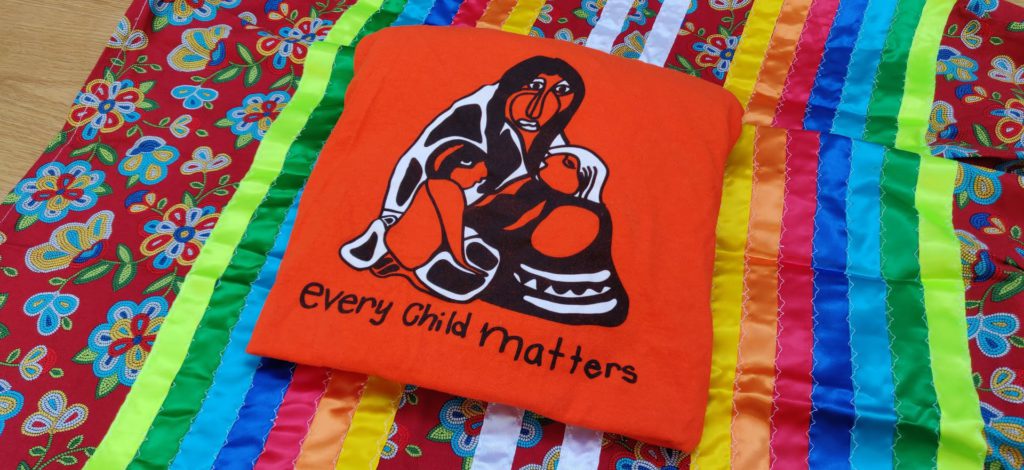Most people have experienced some form of prejudice in their lives. For some, it’s more than occasional: it’s daily and it’s violent. I have privilege, appearing white thanks to my dad and his English/French background, but I am proudly Métis through my mom. Because of my proximity to whiteness, I see it as a responsibility to do better, and hold others accountable to do better. This is how I enact kaa-wiichihitoyaahk, a Michif term meaning “we take care of each other.”

Photo credit: Alicia Hibbert (original photo). All rights reserved.
I have witnessed, heard about, and had stories shared with me by Indigenous friends, family, and colleagues about anti-Indigenous racism. It’s alive and well today, despite the Calls to Action, and despite the strides that have been made. This is a truth that non-Indigenous people need to understand, one that isn’t solved by purchasing one t-shirt (although you should still purchase a t-shirt from an Indigenous artist or organization—I have the 2022 design from S&K Collective).
I believe that when we talk about reconciliation, we need to think about economic reconciliation. Bob Joseph shares in a blog post that, “a return to economic independence is one of the primary objectives of Indigenous Peoples in Canada but the Indian Act, ongoing economic and social marginalization, lack of infrastructure, inequality in funding for equitable education, federally imposed restrictions on the ability of individuals to raise capital are some of the barriers to this goal.”
Over the past few years, many people have been working on learning, on Truth. But sustained action is needed for Reconciliation. This is one reason why I’ve been building towards work as a full-time freelance consultant. So I can weave my path forward with the threads that have the highest, most immediate impact.
My mission with Edified Projects is to:
- Ask hard questions of non-Indigenous authors and their work when writing about Indigenous peoples. Sometimes this means refusing to review/work on a manuscript.
- Through workshops and consulting, ensure organizations consider Indigenous inclusion, not from the perspective of what Indigenous peoples can do to fit into their organization, but what organizations can do to increase their readiness to safely and equitably include Indigenous people in their workforce and procurement strategies. And, that they should do this, rather than going the easy route of what they know.
- Develop strategies and program evaluation frameworks that integrate Indigenous worldviews, when it makes sense to do so (it sometimes doesn’t make sense if it’s just tacked on, rather than integrated across the organization).
- As a collective, compensate all colleagues, no matter their background or formal education and experience, at an equal level across Edified Projects’ work. We split fees proportionately, based on time worked. This is a way we honour everyone’s contribution and life experience.
- Work with Indigenous businesses as much as I can, and support/buy from/procure Indigenous businesses. You can’t begin to believe the awesome ripple effects that occur every time you support an Indigenous business.
I’m sharing this to give you ideas on how to do things differently for reconciliation. Reconciliation Canada has a dialogue guide to get you started moving beyond truth to action, and a lot of great Indigenous-led businesses work with organizations on Reconciliation Action Plans (Rise Consulting, for one!).
Did you know there is a National Indigenous Economic Strategy? Check it out. Some of the actions from this strategy that apply to most companies include:
- Increasing the number of Indigenous Peoples on your boards.
- Starting or contributing to scholarships (like Métis-led COYA did!).
- Evaluating program efficacy in relation to Indigenous Peoples, especially in the workplace.
- Supporting Indigenous training organizations (I’ve mentioned a couple here already).
- Boosting Indigenous procurement. Keep in mind that 73% of Indigenous businesses are not incorporated and 64% have no employees. Knowing this, think about how your procurement policies act as barriers to sole proprietors and microbusinesses.
I’ve told you about some of the actions I’m taking. I’d love to hear yours.
Alicia
